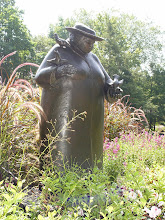The last few months have brought alarming reports on declining insect populations, a phenomenon that has been dubbed the "insect apocalypse." Given that insects are an essential part of all terrestrial food webs (and that a lot of human food depends on insect pollination), this news is beyond alarming. Out for a walk through Toledo's Wildwood Metropark yesterday, I was deeply troubled to find almost no insects in Susan's Meadow, an area generally buzzing with life. (Sorry--I couldn't resist.)
There were a few butterflies flitting here and there, some tiny flies, and an interesting creature I could not identify on a monarda,
but none of the clouds of bees usually found there. Nor were there any goldfinches, whereas last year they were swooping around in what looked like aerial dances. An Ohio summer without insects is Not Normal.
Leaving the meadow and heading toward the manor house (Wildwood having been part of a wealthy family's estate at one time), I decided to check out the rain garden and found where at least some of the bees and other buzzing insects had gone; they were all over a blooming buttonbush (Cephalanthus occidentalis).
This cousin of coffee, gardenia, and sweet woodruff(!), it turns out, was once a major nectar source for a beekeeping industry in the southern US, and is an important larval host for several showy moth species. The Xerces Society (and if you aren't familiar with this organization, you need to remedy that situation immediately) regularly includes buttonbush on its lists of plants for bees and butterflies. In addition to being useful to insects, buttonbush produces fruits eaten by more than fifty species of birds.
These need to ripen for a few months.
This common native plant takes a fair amount of space and water, occurring as it does in wetlands and damp woods, but in the right setting, it seems to garner more insect attention than anything else in the vicinity. Something else to add to your "if you plant it, they will come" list.





